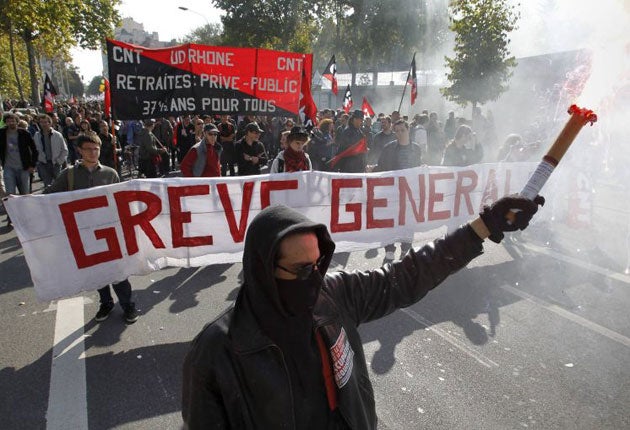Strikers tried to shut down France today with airports, public transport, schools and the postal service all hit in a showdown over government attempts to raise the retirement age.
Refinery workers also walked out, leading one union to warn of looming petrol shortages.
The battle over the contested retirement reform has gone on for months, but this week could prove decisive.
With the Senate expected to pass the pension reform bill by the end of the week, some unions have upped the stakes by declaring open-ended strikes, meaning the walkouts that began today could last for days or even weeks. Past strikes lasted only one day.
Train drivers began their open-ended strike last night, and the stoppages widened to other sectors today. School pupils also were joining the fray, with walkouts expected at hundreds of schools.
More than 200 street protests were planned throughout the country. Last month, similar demonstrations brought a million people onto the streets, according to police estimates, though union organisers insisted turnout was three times higher.
The left-leaning Liberation newspaper ran a headline reading "What if the strike lasted?," while the conservative Le Figaro had a story about how strikes at French oil refineries could lead to shortages by the week's end.
Around 30% of flights were cancelled at France's busiest airport, Paris' Charles de Gaulle, while cancellations at the capital's second airport, Orly, reached 50%s. Most of the affected flights were short-haul domestic flights or inter-European flights.
Workers at all six of oil giant Total's French refineries were striking, and two of them had begun preparations for total shutdowns, said company spokesman.
A third Total refinery had already begun shutdown procedures on Sunday because an unrelated two-week-long strike by port workers had blocked shipments of crude oil for processing.
The CGT union said that fuel shortages were possible "in the very near future."
Participation in the strikes varied by sector.
Around a fifth of elementary and high school teachers were striking - fewer than the number that took part in the last strike, on September 23.
With service on suburban trains and the Paris Metro and bus lines slashed by about half, commuters rolled into work on bikes, rollerblades and skateboards. The French capital's free bike racks were empty as many took advantage of the brisk, sunny morning to cycle to work.
Because strikes are frequent in France, commuters have become experts at dealing with problems and travellers at Europe's largest train station, Paris' Gare du Nord, appeared to be taking the latest walkout in stride.
"I understand the strikers, I tolerate it," said Fuad Fazlic, 38, as he rolled his ten-speed bicycle out of the station on his way to work. He said the strike had not disturbed his morning commute by train from Senlis, a town north of the capital, and with his bike to get around Paris, he was not worried about slowdowns on the capital's buses and subways.
President Nicolas Sarkozy's conservative allies insist there is no choice but to buckle down and accept the reforms which would raise the retirement age from 60 to 62. Faced with huge budget deficits and sluggish growth, France wants to get its finances in better order. Even with the reforms it would still have among the lowest retirement ages in the developed world.
Unions fear the erosion of the cherished workplace benefit, and say the cost-cutting axe is coming down too hard on workers.
The new nationwide strikes were the fifth since May, including two last month that coincided with protest marches that drew at least a million people into the streets.

Join our commenting forum
Join thought-provoking conversations, follow other Independent readers and see their replies
Comments